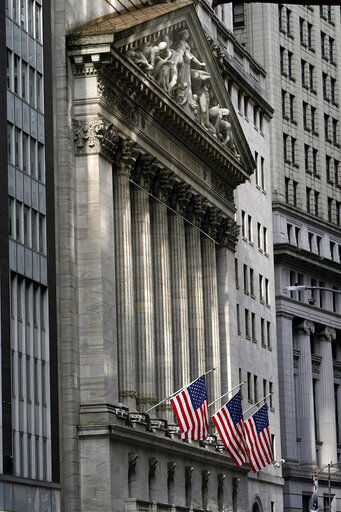Technology and energy companies helped pull stocks lower on Wall Street Monday, a downbeat start to the week following the market’s best weekly gain since February.
The S&P 500 fell 0.9%, giving back some of its gains after the benchmark index climbed to an all-time high Friday. The Dow Jones Industrial Average fell 0.9%, while the tech-heavy Nasdaq composite slid 1.4%.
Small-company stocks fared worse than the broader market in a signal that investors are concerned about economic growth. The Russell 2000 shed 1.4%.
The market’s pullback, with the S&P 500 fresh off its 67th all-time high this year, comes as investors look ahead to the Federal Reserve’s latest economic and interest rate policy update on Wednesday. Markets expect the central bank will announce plans to accelerate its timetable for reducing bond purchases aimed at keeping long-term interest rates low.
“What the Street is not sure about is when the Fed will actually start to raise interest rates,” said Sam Stovall, chief investment strategist at CFRA.
The S&P 500 fell 43.05 points to 4,668.97. The Dow slid 320.04 points to 35,650.95. The Nasdaq dropped 217.32 points to 15,413.28. The Russell 2000 gave up 31.31 points to 2,180.50.
Stocks have been mostly pushing higher, despite a volatile stretch in late November as worries about the rise of the omicron variant of the coronavirus initially roiled markets. Some of those concerns eased last week amid encouraging signs that the variant may be less dangerous than delta.
But remarks by U.K. Prime Minister Boris Johnson over the weekend may have dampened some traders’ optimism. Johnson warned Sunday that Britain faces a “tidal wave” of infections from the omicron variant, and announced a huge increase in booster vaccinations to strengthen defenses against it.
Several big pharmaceutical companies, including COVID-19 vaccine makers Moderna and Pfizer were among the biggest gainers in the S&P 500 Monday. Moderna jumped 5.8% for the biggest gain in the index. Pfizer rose 4.6% following news it is buying Arena Pharmaceuticals.
More than 60% of the stocks in the S&P 500 fell, with technology stocks, banks and a mix of companies that rely on consumer spending weighing the index down most. Nvidia fell 6.8% for the biggest drop in the S&P 500. Bank of America dropped 2.1% and General Motors slid 6.5%.
Energy stocks took some of the heaviest losses as the price of U.S. crude oil fell 0.5%. Devon Energy slid 5.4%.
Automakers and travel-related companies also fell. Ford lost 4.8% and Carnival dropped 4.9%.
Bond yields fell. The yield on the 10-year Treasury fell to 1.41% from 1.49% late Friday. That weighed on banks, which rely on higher bond yields to charge more lucrative interest on loans. Capital One fell 2.9%.
Harley-Davidson rose 4.7% after saying it will take its electric motorcycle division public through a blank-check company, valuing the enterprise that has been part of the motorcycle maker for 10 years at $1.77 billion.
In addition to the Federal Reserve’s policy statement, investors will be monitoring several economic reports this week to gain more insight into economic growth as 2021 comes to a close and the world continues to try and shake off the impact from COVID-19.
Wall Street will get an inflation update on Tuesday when the Labor Department releases its Producer Price Index for November, which shows how inflation is impacting costs for businesses. That report will be especially important with the Fed meeting on Tuesday and Wednesday.
Persistently rising inflation has prompted the central bank to hasten its plan to trim bond purchases that have helped keep interest rates low. Investors will be listening for any statements that add detail to the timing of that plan and hints at how that might impact how soon benchmark interest rates are increased in 2022.


